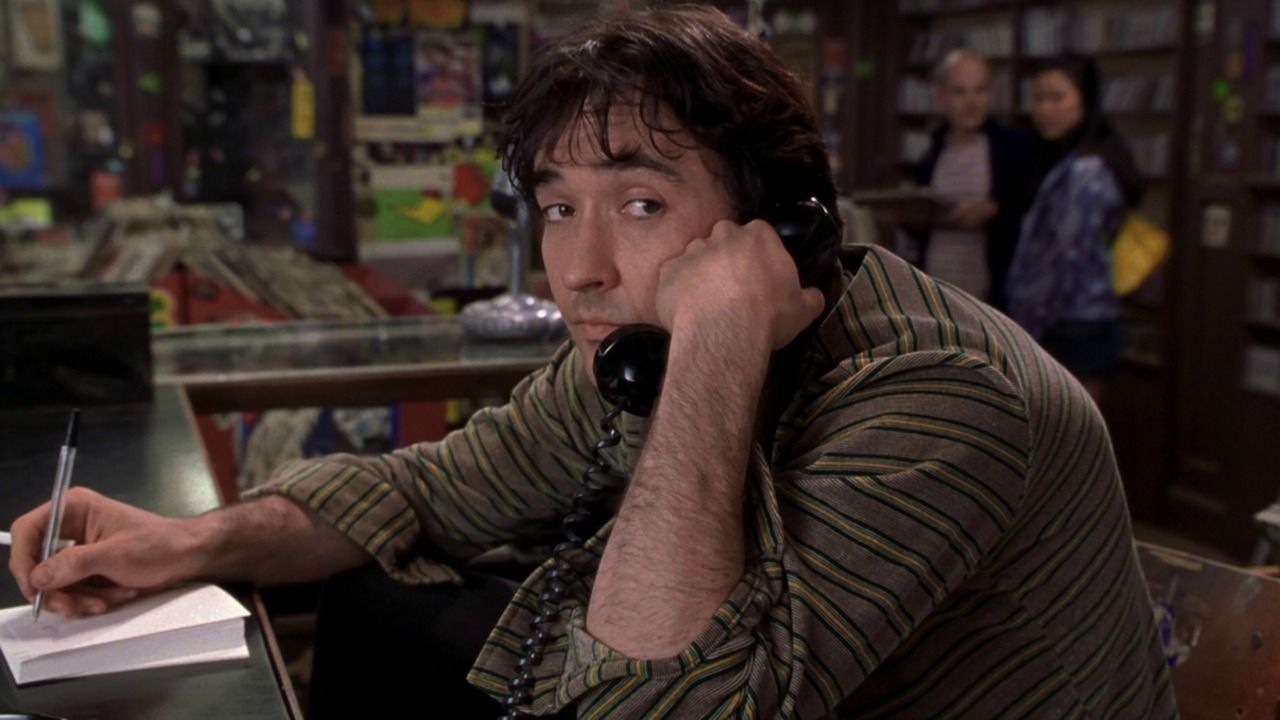Director: Stephen Frears
Writer: D.V. DeVincentis, Steve Pink, John Cusack, Scott Rosenberg
Stars: John Cusack, Iben Hjejle, Jack Black
Synopsis: Rob Gordon, a self-absorbed record store owner and music obsessive, embarks on a journey of self-reflection after his girlfriend leaves him, revisiting his past relationships to understand his repeated romantic failures. As he grapples with his fear of commitment, not just in love but in life, he begins to realise that growing up means more than just having good taste in music
Few films capture the cultural zeitgeist of Generation X quite like High Fidelity (2000). Adapted from Nick Hornby’s novel, it is a time capsule of a world when physical media reigned supreme, music snobs debated endlessly in record stores, and flannel-clad cynicism was the fashion of the day. Celebrating its 25th anniversary, High Fidelity is as charming as it is frustrating, often as self-absorbed as its protagonist but still undeniably engaging.

Rob Gordon (John Cusack) is a 30-something record store owner, spending his days ranking his favorite songs, bickering with his employees over musical trivia, and carefully curating his identity through taste. When his girlfriend Laura (Iben Hjejle) leaves him, he embarks on a self-reflective journey, revisiting past relationships to understand why women always leave him.
It quickly becomes clear that Rob’s biggest problem is… Rob. He’s selfish, commitment-phobic, and wallows in self-pity. The film knows this, but it doesn’t offer a dramatic arc of redemption, just an incremental step forward. What saves Rob (and the movie) is Cusack’s sardonic charm. At his peak, Cusack specialized in playing self-involved yet strangely endearing slackers. His presence signals to the audience that Rob will be a difficult protagonist but one worth sticking with. High Fidelity isn’t about watching someone radically transform, it’s about watching someone maybe grow up, just a little.
Beneath its snarky exterior, High Fidelity is a film about commitment, not just to love, but to creating rather than critiquing. Rob is a man who defines himself by his opinions rather than his actions. His reluctance to truly invest in his relationships mirrors his reluctance to take risks elsewhere in life. His turning point isn’t just about realizing he loves Laura, it’s about finally stepping out of the role of passive observer and taking creative chances, producing a record for a local band. The film makes a compelling case that commitment isn’t about finding the perfect person, job, or project, it’s about choosing something over the infinite possibilities of what could be.
While Cusack anchors the film, the supporting cast elevates it. Joan Cusack, Catherine Zeta-Jones, Lisa Bonet, and Tim Robbins all shine in small but memorable roles. But let’s be honest, the film belongs to Jack Black. As Barry, Rob’s loud, opinionated employee, Black is a force of nature, stealing every scene with his manic energy. His performance is so good that it arguably disrupts the film’s balance, making Rob’s brooding feel even more indulgent in contrast.
In spite of its positives, High Fidelity falters in its storytelling structure. The film meanders, full of clever but sometimes superfluous scenes. The Marie De Salle (Lisa Bonet) sequence, for example, is stylish but ultimately doesn’t push the story forward. The film revels in celebrating music geekdom, but, at times, it loses sight of its own narrative arc. Rob’s climactic revelation, his realization that he needs to grow up, arrives suddenly and feels unearned. The book handles this more effectively, giving us a clearer sense of internal reckoning and a clearer arc to his emotional development.

Watching High Fidelity in 2025, one can’t help but feel nostalgic for the era it captures. It was made just before digital music consumption wiped out record store culture. The joy of discovering a rare vinyl, of arguing passionately about the best album of all time with fellow enthusiasts in person, is something today’s online forums can’t quite replicate.
But the film hasn’t aged flawlessly. Modern audiences may be less forgiving of Rob’s self-absorbed worldview and the way the story largely revolves around his perspective, often sidelining Laura’s. The gender politics feel outdated, Rob’s behavior towards women, once excused as clueless man-child antics, now read as self-indulgent and toxic.
For all its flaws, its structural scruffiness, its occasionally indulgent protagonist, High Fidelity remains compelling because it understands something fundamental about fandom, identity, and the fear of commitment. Its blend of humor, heartache, and obsession with musical minutiae gives it an enduring charm. We might roll our eyes at Rob more than we did in 2000, but for those of us who have ever obsessively ranked their favorite albums or argued about the greatest song of all time, High Fidelity still strikes a chord.





